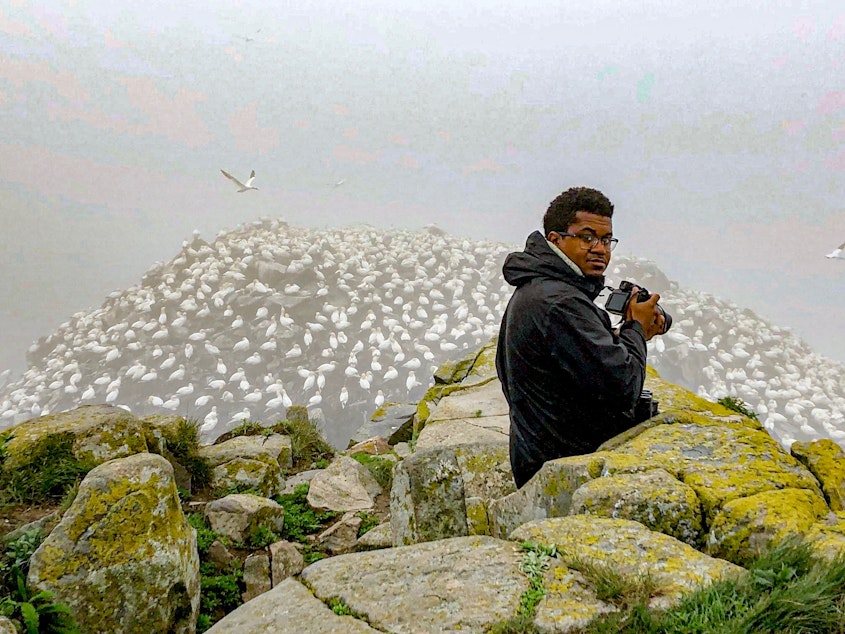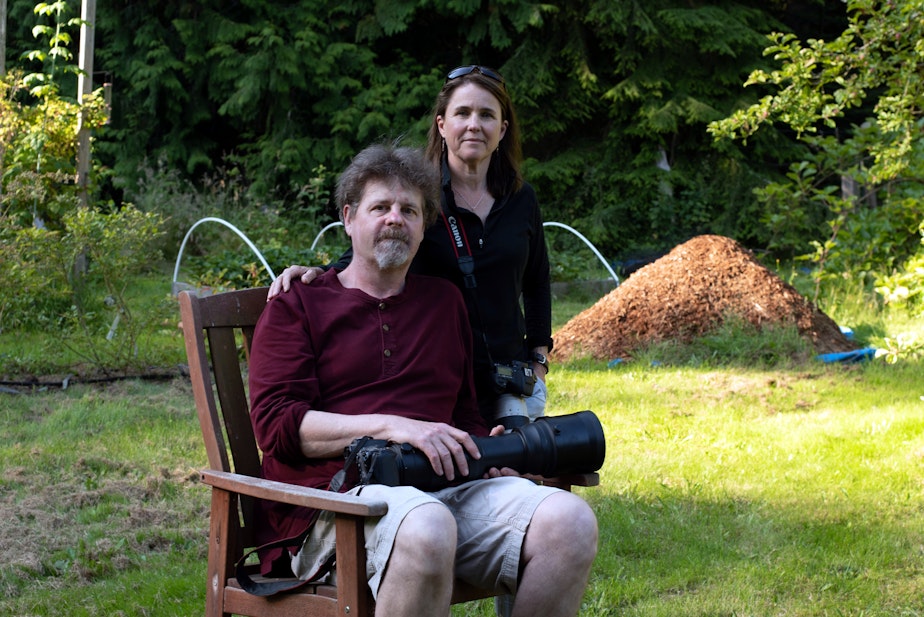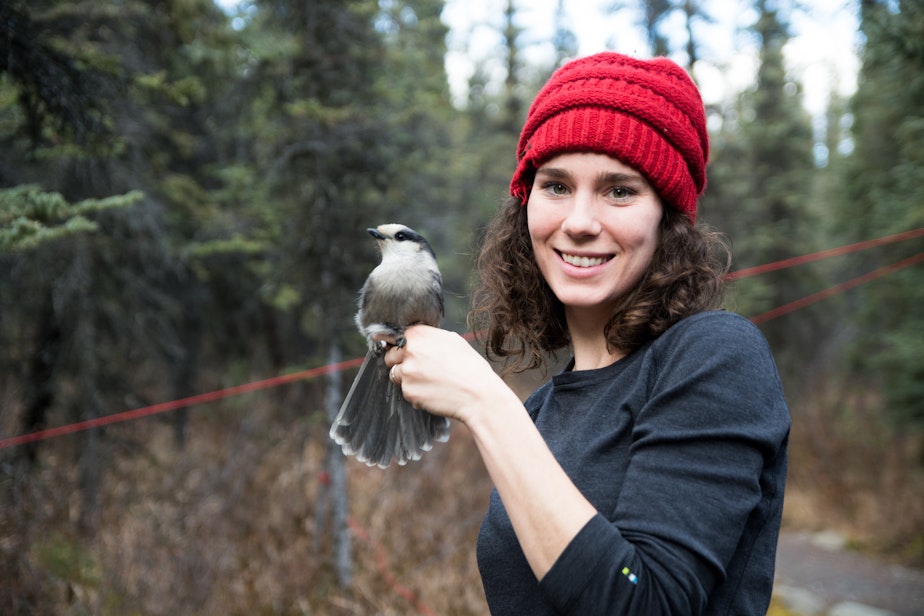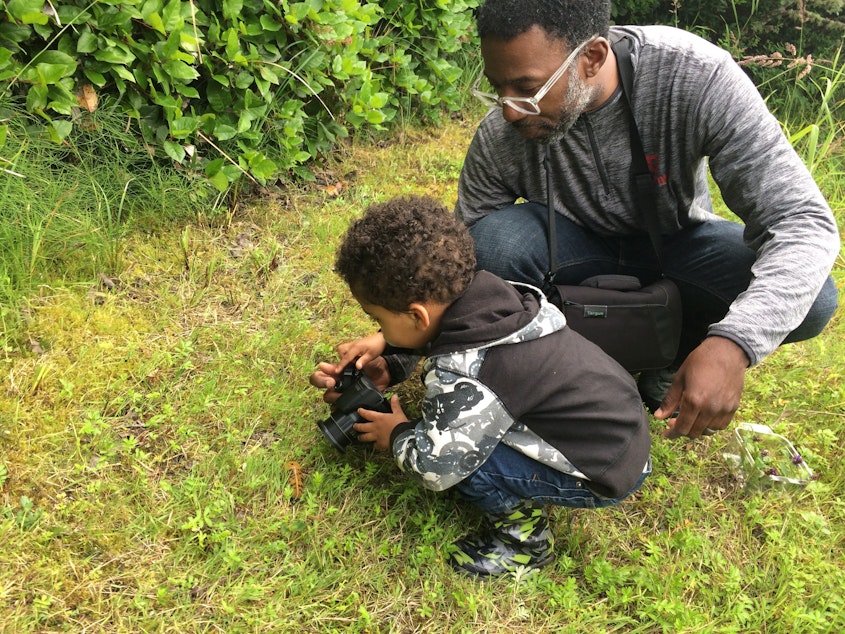The tale of the Black birders and ruffled feathers on Facebook
When Armand Lucas goes out looking for birds, he doesn’t immediately bring his binoculars to his face.
“I think bird watching is a little bit of a misnomer," he said. "Bird listening is usually what prompts seeing birds. And so I’m always listening for birds way before I am seeing them."
Lucas is an environmental scientist who works for a very large Seattle company. When he moved here from the East Coast about a year and a half ago, he wanted to connect with the local birding community. So he joined a Facebook group called Western Washington Birders, which has more than 10,000 members.
“It’s just a place where people can share photos and come together around a common love, and so it’s nice,” he said.
Lucas is biracial. His dad is Black and his mom is Latina. He says that most of the time when he's out birding, he meets wonderful, friendly people. But every so often, things can get ugly.
“Probably a month ago, I was bird watching and a pickup truck drove by me and yelled the 'N' word at me and then kept driving," he recalled.
Sponsored
Many people got a taste of what life can be like for Black birders when they saw the now-famous video of Christian Cooper's confrontation with Amy Cooper, a white woman, in Central Park. He had asked her to put her dog on a leash. She called the police, telling them that an African-American man was threatening her. The video went viral and she eventually lost her job.
In the aftermath of that event, Black birdwatchers began sharing their experiences more widely.
The South Seattle Emerald, an online community newspaper, interviewed Lucas and Seward Park Audubon Center Director Joey Manson for a story about Black birders—and someone posted it on the Western Washington Birders Facebook page.
But it wasn't there for very long. Administrators of the page took the post down, according to Lucas, along with a handful of other posts that dealt with racism and race.
“It was mostly disappointing, but I wasn’t too surprised,” Lucas said. “The problems we have in our country ... people don’t want to talk about them, they want to ignore them until they become so volatile that we are seeing what we are seeing.”
Sponsored
The administrators of Western Washington Birders did not reply to multiple requests for comment.
W
estern Washington Birders is apparently not the only Facebook group suppressing discussions of race.
Jason Ward is a naturalist and birder who lives in Atlanta. He hosts a documentary series on YouTube called Birds of North America.
After the Christian Cooper incident, Ward helped organize an online series of events called Black Birders Week. Its goal is to promote diversity in birding and to bring the challenges that Black birders face to the forefront.
Sponsored

As the week unfolded, people around the country began messaging Ward that posts about the events were being deleted from a number of birding Facebook groups.
“Two hundred comments later, we have about 12 total groups give or take that have either suppressed or straight up deleted posts," Ward said.
The groups gave varying explanations for their actions, according to Ward. Some banned the posts because they considered them political. Others said they just wanted to keep their pages focused on bird photos and nothing else.
“You know what I’ve heard a lot: 'This is a place that people come to escape.' Well, that’s beautiful and that’s fine, but that is exercising a certain privilege... because birding for me is something that I love, I am super passionate about it. I don’t get to separate my skin color from that," Ward said.
Sponsored

F
acebook groups, even those with thousands of members, are not public forums; they are more like private clubs. They are usually started by individuals who admit members, establish the rules and moderate posts.
Sponsored
Michelle Grimmer and her husband, Dave, run the Facebook group Pacific Northwest Birding, which has about 4,000 members. The Grimmers, who are white, say they started their group about three years ago for purely selfish reasons -- they wanted to know where to find interesting birds.
Members would post bird pictures, and the group basically ran itself. Until now.
“I’m trying to figure out what the right thing is,” said Michelle.
The Grimmers consider themselves to the left politically. But Michelle says what they’ve discovered is that it’s really hard to moderate discussions about race and racism.
“There will be people who attack from both sides. And it gets really cruel," Michelle said.
They’ve agonized about what to do with their page. They both have really busy jobs — Michelle is a hospital nurse and her main concern right now is Covid-19. So they’ve ended up posting a statement on their page supporting Black Lives Matter and acknowledging systemic racism. But they are restricting members’ posts to bird photos only, for now.
While this drama is playing out on Facebook, birding organizations and scientists are starting to weigh in.
Seattle Audubon, an independent chapter of the National Audubon Society, issued a statement last week critical of Facebook groups that censor discussions of race and racism. It specifically called out Western Washington Birders, saying the group has been "troublingly unmoved" to make any changes.
"Seattle Audubon will no longer promote its events, classes, field trips, or other activities on channels that do not allow the free and respectful discussion of these topics or engage in any other discriminatory moderation of content. We ask that all our members and volunteers follow suit and not share Seattle Audubon content on these platforms," the statement said.

Kaeli Swift, a University of Washington bird expert who is well known in local birding circles for her research on crow funerals, has contacted several Facebook administrators asking them to consider opening up their forums to discussions of race.
"I do think we have an obligation to put a lot of pressure on them," she said. "There are people in your community who are asking to be listened to."
Swift started a new Facebook group for birders that welcomes conversations about birding and race. The goal of West Coast Birders is to create a "more inclusive birding community." It has about 1,400 members.
Damon Taylor is one of them. He's a former journalist who will be starting a job as a teacher in the fall.
Taylor says he's noticed that birders tend to be "older, more homogeneous, probably trending to more white and well-to-do" and for them, and having conversations about difficult topics like race "is not polite discussion," he said.
The reality of being a Black birder is that out in remote areas, like in national forests, he can feel "not scared, but tentative." Will he meet someone hostile or racist on the trail? What would he do if no one else is around? "You just don't know," he said.

Taylor said Facebook groups are perfectly within their right to restrict posts. "But they should get used to ongoing tension about it, because people that they know or people like myself have other experiences and concerns," he said.
In this environment, as the nation wrestles with its history of racial injustice, these Facebook groups are sending a message, he said.
"You are kind of broadcasting some kind of resistance to inclusion or acceptance of other people's experience that doesn't reflect very well for your group. And is that okay for you?"
So where does that leave Armand Lucas, the birdwatcher in Discovery Park from the beginning of this story?
Despite the controversy, Lucas says he still enjoys the photos and the community in Western Washington Birders. He says most of the birders are well-meaning, and they might not even know what’s happening behind the scenes.
But his opinion of the administrators has changed, and he hopes that they can start to see these issues through other people's eyes.
"If the person who was being marginalized or discriminated against when they are going out into the outdoors was their brother, friend, uncle, sister -- how would they feel?"



